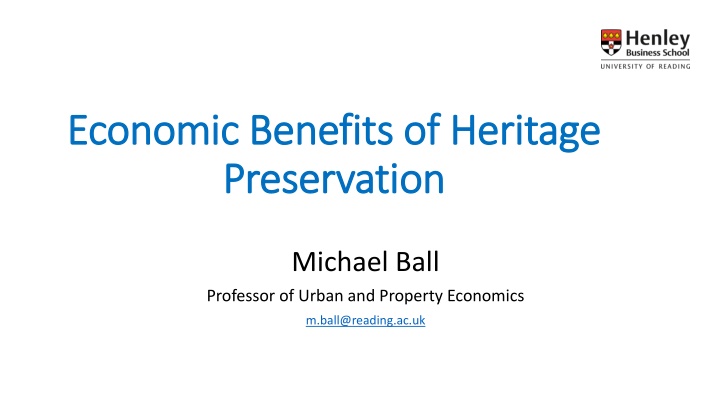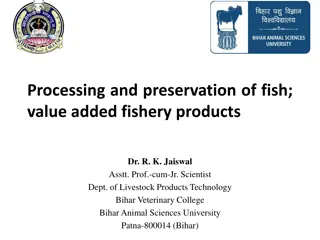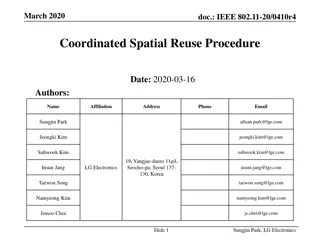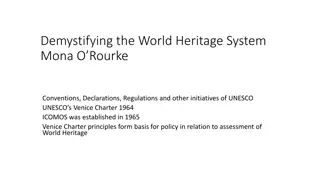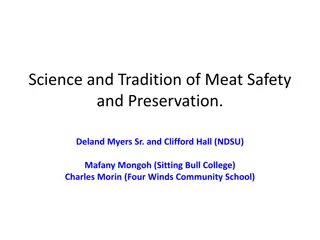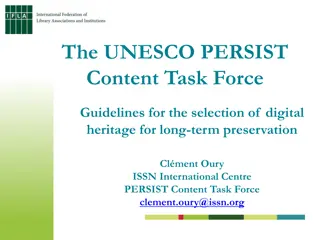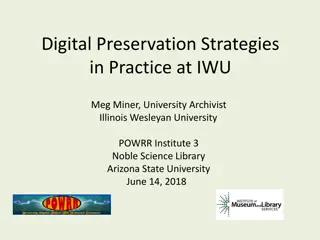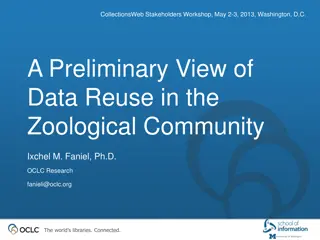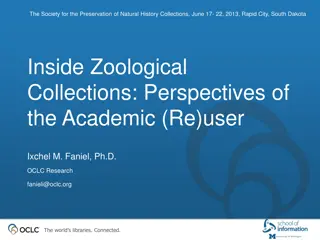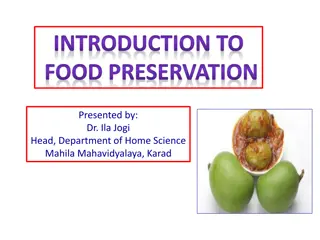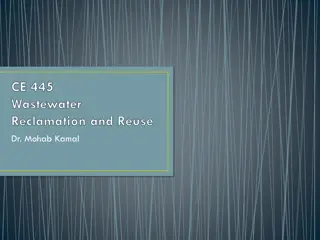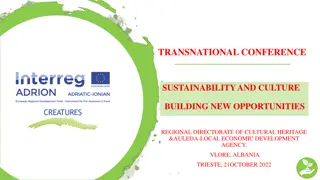Economic Benefits of Heritage Preservation and Successful Strategies for Adaptive Reuse
Exploring the economic advantages of heritage preservation, this content highlights the value of heritage as a consumption good, attracting skilled labor, boosting economies, and encouraging innovation. It emphasizes the key lessons for successful heritage preservation, the need for investments in adapting old buildings, and utilizing them in modern contexts. Furthermore, it discusses how higher incomes correlate with increased engagement in heritage activities and investments.
Download Presentation

Please find below an Image/Link to download the presentation.
The content on the website is provided AS IS for your information and personal use only. It may not be sold, licensed, or shared on other websites without obtaining consent from the author.If you encounter any issues during the download, it is possible that the publisher has removed the file from their server.
You are allowed to download the files provided on this website for personal or commercial use, subject to the condition that they are used lawfully. All files are the property of their respective owners.
The content on the website is provided AS IS for your information and personal use only. It may not be sold, licensed, or shared on other websites without obtaining consent from the author.
E N D
Presentation Transcript
Economic Benefits of Heritage Economic Benefits of Heritage Preservation Preservation Michael Ball Professor of Urban and Property Economics m.ball@reading.ac.uk
Themes Themes Heritage as a consumption good Heritage, the economy & innovation Mobilising consensus Heritage as beneficial cheap space Land taxation & preservation MBHECSP18 2
Heritage Heritageas a consumption good for all as a consumption good for all Tourism Leisure culture, restaurants, etc. Many economic studies show that heritage homes & neighbourhoods are highly valued Extra 10-20% on prices Attracts skilled labour force to cities Boosting their economies, encouraging innovation Most studies from Europe & N. America How relevant elsewhere? MBHECSP18 3
Key Lessons of Successful Heritage Preservation Key Lessons of Successful Heritage Preservation Investment is required to adapt old buildings to modern standards & needs Upgrades retrofitting Neighbourhoods need to upgrade in service provision as well as investment Health, safety, schools, etc. Mixing old with new Varies depending on location & mix of uses Not recreating the past but benefitting from it MBHECSP18 4
Living the present in older buildings Living the present in older buildings Needs skill & good design Keeping best of old with advanced conditions of now Ingenuity in new uses Harmonising cutting edge design with structures of past Fashion shows, art galleries, new homes in iconic shells as examples MBHECSP18 5
Higher incomes generally lead to more Higher incomes generally lead to more heritage engagement heritage engagement Evidence suggests in higher income countries built heritage valued more Also, higher income groups in any country have greater willingness to invest in heritage More money & time MBHECSP18 6
Implication 1: Save heritage for future Implication 1: Save heritage for future generations generations As economies develop leads to higher incomes & greater interest in heritage So, need to think of the future & not destroy the best of the past Example of China MBHECSP18 7
Implication 2: Leveraging private investment Implication 2: Leveraging private investment Higher income groups encourage private investment in localities If handled sensitively leads to greater sustainability of heritage Does not then rely on continuing state subsidy MBHECSP18 8
Implication 3: Political muscle Implication 3: Political muscle Higher income groups good at political power Leads to regulations & subsidies benefitting heritage Good at approaching media & projecting messages But need legitimation in democratic societies Creates basis for alliance across social groups Heritage for all, often at different locations Consensus been achieved in many advanced economy cities Though always fragile as land & other resources scarce MBHECSP18 9
Need consensus for regeneration success Need consensus for regeneration success Clear evidence that popular groups often appreciate heritage City-wide or in neighbourhood But often lack financial & political means So, often need to build up alliances to leverage state action MBHECSP18 10
Economic viability Economic viability Heritage preservation has to be sustainable Have viable consumption use Create jobs across spectrum Encourage businesses Small scale as well as others If preservation successful may lead to higher land values Which crowd out existing uses May need to think of regulations to limit that MBHECSP18 11
Heritage, land values & innovation Heritage, land values & innovation Rundown built heritage often associated with low land values & development risks Creates opportunities as well as problems Low rents encourage new activities Ways of living & working If can encourage these dynamics can improve lives & economy Implication: Don t always gold plate renovations Avoid property owners holding onto vacant properties or dreams of high rents MBHECSP18 12
Land taxation & renovation Land taxation & renovation However, renovation cannot always be assumed to generate high taxable land values But evidence above suggest that renovation in key locations benefits city as a whole So, maybe justification for using development taxes from elsewhere in city to support sustainable renovation MBHECSP18 13
